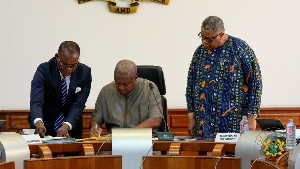Mr Chris Addy Nayo, ACPcultures plus Culture Policy Project Team Leader has urged government to introduce relevant polices and provide the necessary funding to help the culture sector grow and attract more foreign exchange.
The culture expert expressed optimism that giving meaning to the role of arts and culture manifested in traditional music, dance, clothing and drama can earn the country billions of dollars to spur growth and create jobs.
Mr Nayo told the Ghana News Agency on the side-lines of a seminar on the status of culture and arts sector in West Africa and the potential for growth and development under the EU-ECOWAS economic partnership agreement.
The seminar brought together Culture and Arts stakeholders from across the West African sub-region and the Caribbean to review a study research and share experiences and best practises from different actors.
The meeting forms part of a project being implemented by the Centre for Cultural and African Studies of the Kwame Nkrumah University of Science and Technology (KNUST).
The project is tiltled – “Facilitating the development and growth of the culture and arts sector under the EU-ECOWAS economic partnership agreement.”
According to the United Nations Educational, Scientific and Culture Organisation, world trade of creative goods and services totalled a record of $624 billion in 2011, more than doubling between the years 2002 and 2011, whiles growth in developing country exports of the arts averaged 12 per cent annually between 2002 and 2011.
The organisation said culture is a powerful tool for poverty eradication, helping to meet the ambitious goal to reduce the number of people living on less than $1.25 a day to three per cent of the population by 2030.
In spite of the sectors significant contribution, Mr Nayo said: “governments have been paying lip service to the cultural sector, but it is very important governments see the cultural sector the same way as they see agriculture, mining and industry to come out with relevant policies,”
He explained that the sector was similar to a raw material that government needs to invest money into to get value, the same way it pumps into other sectors including crude.
“If you are investing in the mines to get value out of it or crude oil or oil ore to get value, you should also similarly invest in the cultural sector to get value, so governments should come out with relevant policies as well as provide funding to grow the sector.”
He said formulation of the right policies and provision of the necessary funding would go a long way to improve quality, packaging and standardisation of the Ghanaian culture and creative arts to attract huge market.
“Our culture is rich, very rich more than some of these foreign products that we tend to consume.
“The only difference is that they are able to package theirs in a much quality way which attracts us, so to respond to these challenges is to also package our culture in such a way that it will be more attractive in terms of its ability to attract foreigners.”
“The same way governments need to invest just in a way that the product in the market will be packaged nicely, improve the quality, the standard and packaging. Foreign culture attracts us not because they are better than ours but because they pay attention to these things.”
He said the sector ought to be given the seriousness it deserved to help players of the industry carry out effective promotion and bring in income by “selling our culture, or our artists to abroad to perform.”
“Actors must be supported with training, provide opportunities for them to collaborate with international partner organisations so that they can come out with more quality products,” he said.
But the Deputy Minister of Tourism, Culture and Creative Arts, Mrs Dzifa Gomeshie expressed worry that certain bills meant to chart a policy direction have often been stalled due to delays by some legislators who question it “too much”.
She said the ministry was trying to get the film bill passed but somehow it has delayed due to so many queries raised by some of the lawmakers.
“You cannot question too much about a document that has been produced by eminent people, who have worked so hard to get it done,” she added, and urged the legislators to support the bill to be passed into law to help streamline the film industry.
Regional News of Monday, 26 October 2015
Source: GNA
Pump more money into Arts and Culture – Expert
Entertainment











